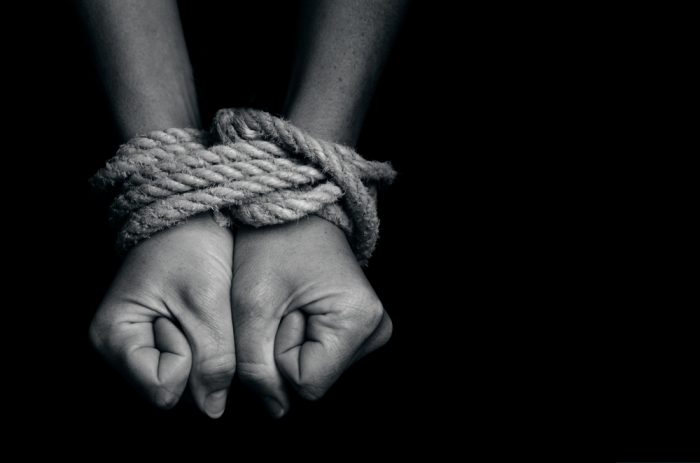One possible indicator, or red flag, of sex trafficked victims includes numerous abortions, pregnancies and miscarriages. Other red flags can include the frequent use of emergency contraception, as well as a teen being accompanied by older boyfriend or an adult that is not a family member. Therefore, medical staff must be vigilant to report suspicion of abuse. But there are also things that the general pro-life community can do to help. The pro-life message is one of human rights, compassion, and love for mother and child, and pro-life people on the front lines — outside abortion facilities, working at pregnancy centers, etc. — are ideally positioned to identify these victims.
Live Action’s new docuseries exposes how sex trafficking and abuse victims often go to Planned Parenthood for help — and Planned Parenthood simply returns them back to their dangerous situations. Live Action founder and president Lila Rose stated in a press release:
Despite Planned Parenthood’s public rhetoric as well as laws requiring it to report suspected abuse, its failure to report has been deliberate and widespread. Time and again, rather than reporting abuse to authorities, Planned Parenthood has repeatedly looked the other way and performed abortions on victims as young as 12 years old. These girls deserved advocacy but instead Planned Parenthood staff ignored their abuse and returned them to the waiting arms of their abusers.
Because of flagrant violations like these, the proposed Title X rule tightening on reporting abuse is absolutely necessary. Planned Parenthood has proven that its priority is selling abortions, not caring for the most vulnerable of girls. Planned Parenthood’s culture of cover-up must end, the cycle of abuse of innocent children must end, and Planned Parenthood’s half a billion dollars in annual federal funding must end. Taxpayers cannot be forced to subsidize these abuses of children.
Cindy Collins, a long time pro-life advocate who is educating the pro-life community about human trafficking, is the founder of SpeakHope.net and has served on Louisiana Governor’s Human Trafficking Commission. She has provided testimony for Louisiana legislation requiring human trafficking awareness signage to be placed inside abortion facilities. She also provided information and resources for help regarding the state’s informed consent literature for women seeking abortion.
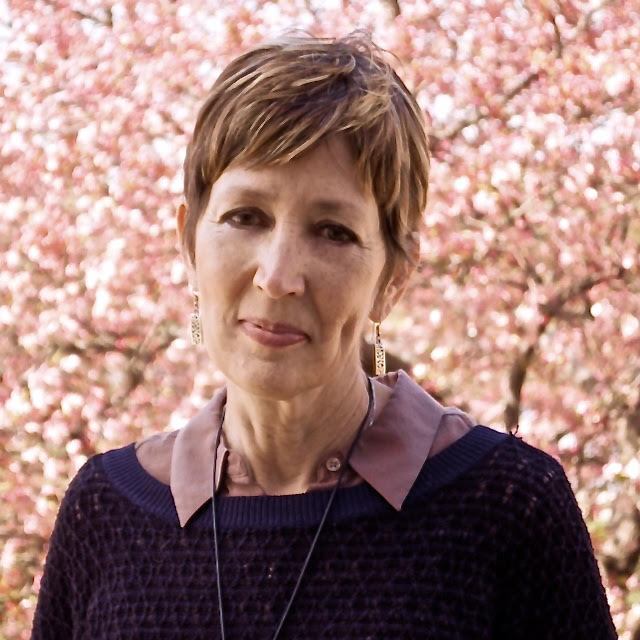
Cindy Collins pro-life advocate and educator on sex trafficking
In addition, Collins has participated in training and workshops on predatory relationships, human trafficking, and forced abortions. She has presented her findings both nationally and internationally at the National Right to Life Conference, Heartbeat International Conference, Texas Pregnancy Care Network, as well as the United Nations Conference on the Status of Women, Israel Be’ad Chaim (Pro-Life) Conference and Cherish Life Australia Conference. She currently serves as a global advisor for Operation Outcry and as a board advisor of the American Association of Christian Counselors (AACC), Reproductive Loss and Sexual Trauma Division.
Collins told Live Action News that she is post-abortive and has tragically experienced abortion several times. Later, she helped to found a pregnancy center in her home state of Louisiana where she ministered to abortion-minded women on a regular basis.
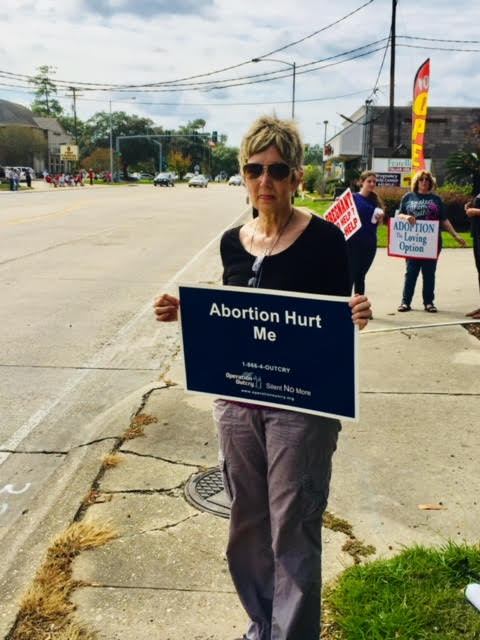
Cindy Collins pro-life advocate on streets in Louisiana
“Those abortions led me into a lot of destruction,” Collins said, adding that she came to understand that her destructive behavior leading to her abortion kept her in emotional captivity. The freedom and insights she learned in dealing with her past led to her compassion for the victims of human trafficking. “There but for the grace of God go I, that I could have been held captive because of the destruction in my life. This has given me awareness for what I do now,” she said.
After years of pro-life ministry, Collins said the Lord led her to women who were working in the commercial sex industry:
I was invited to go on a team to minister to strip clubs down town understanding that many years ago, I could have been one of them. After 30 years of working in the pro-life movement and abortion recovery, I asked the Lord why I was going there now. Then, after a few years, I began to realize that the single moms working in the clubs were hurting like I had been. Soon, I was having encounters with women in dressing rooms inside strip clubs and discovered that many had been forced to have abortions.
The Lord showed me there are captives that need help through pregnancy centers and the pro-life movement, but He also showed me that children held outside the womb through sex trafficking also deserve life, love, and to fulfill their destiny.”
Collins sees her focus as reaching women and children inside as well as outside the womb. As such, she sees a real need for the pro-life community to become better educated to work to free victims caught up in the commercial sex trafficked industry, both physically as well as spiritually and emotionally.
“What the pro-life movement is missing,” Collins shared, “is first, how we are looking at the women forced to work in these areas? I began to discover that the pro-life community was looking at these women in the wrong way. Were we valuing these women and their babies the same as the college student who might come into our center?”
She added, “The pro-life movement has to get involved. We have to understand and change our mindsets, and see the victims who potentially are being forced to submit to abortion through new eyes. They’re being told if they don’t have that abortion their pimps will kill them. He threatens to kill their family or children.”
In her research on human trafficking, Collins discovered that women and children trapped in sex trafficking usually have some form of sexual abuse in their past. One study showed that 70 percent of women interviewed that were sex trafficked became pregnant and about 55 percent of these victims say they will be forced into an abortion during their captivity.
A 1999 report by the Center for the Study of Intelligence found that sex trafficked victims endure “threats of physical abuse against themselves and/or their families are also common in order to force cooperation. Traffickers also play upon the women’s fears of arrest and deportation. In additional cases, trafficking victims suffer extreme physical and mental abuse, including rape, imprisonment, forced abortions, and physical brutality.”
In 2002, according to a report by the New York Times, police raided a house, expecting to find an underground brothel. What they found instead was horrific. Inside were victims of sex trafficking between the ages of 14 and 17, all Mexican nationals without documentation. The girls were forced to live in squalid conditions, described by the paper as a “land-based equivalent of a 19th-century slave ship.” Police also uncovered a “stash of penicillin” along with abortion-inducing drugs.
One victim of sex trafficking told Facing Life Now TV that women and girls are also taken to abortion clinics by their pimps or by people working for the pimp. “Marlene,” who had become “trusted” by her pimp, told the interviewer that she was responsible for booking abortions when a woman became pregnant, saying, “The pimps and the traffickers would get fake I.D.’s for the girls and we would take them to have abortions.”
When asked if abortion facilities like Planned Parenthood would turn down the abortions for the girls, she replied, “Oh, no, absolutely not…. Honestly they had to know that these were teenagers; they were not adult women.”
Marlene said that participating in these abortions traumatized her. She recalled a 14-year-old sex trafficked victim who became pregnant and was being forced to have an abortion: “So, I had the whole house raided — she was rescued,” she said.
A study published by the Annals of Health Law in 2014, Health Consequences of Sex Trafficking, supports Marlene’s claims. Authors Laura Lederer and Christopher Wetzel interviewed several women victimized by sex trafficking and found that survivors had “significant contact with clinical treatment facilities, most notably Planned Parenthood.”
As Live Action News previously reported, roughly two-thirds of survivors who specified a location for their abortions identified an abortion facility as the site of their abortions, indicating ongoing systemic problems inside the abortion industry. One survivor told the researchers, “I was under serious pressure from my pimps to abort the babies.” And one sex trafficking victim told researchers she was taken to Planned Parenthood because “Planned Parenthood didn’t ask any questions.”
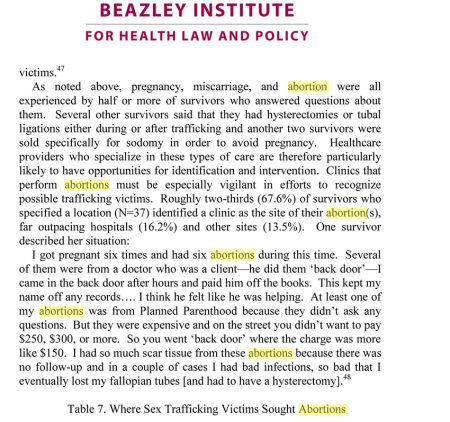
Planned Parenthood doesn’t ask questions about sex trafficking victims
Tragically, one of the victims interviewed said she had as many as 17 forced abortions.
“There has to be laws that make it clear that these abortion facilities are required to report,” Collins said.
Study author Laura Lederer testified to lawmakers that 55 percent of the women she interviewed reported having at least one abortion, and about half of those said they had been coerced.
Sadly, sex trafficked victims, rather than abortion workers who failed to report the abuse, are often the ones facing prosecution. Last year, the Texas Tribune reported on a case in which “a pimp… had sold a 16-year-old girl for sex over two years. The girl suffered horrific abuse at his hands — she was raped, impregnated and forced to have an abortion. When she tried to run away, the pimp carved his initials into her forearm.” Tragically, rather than receiving treatment upon her eventual arrest at the age of 19, the victim was sent to prison.
“It’s a great example of the cyclical nature of trafficking and how devastating it is, and how if you do not intervene it will indeed continue, and just continue to breed itself both victims and defendants,” Kirsta Melton, who leads the Texas Attorney General’s Office’s sex-trafficking unit, told the Tribune.
Live Action News has documented the way that Planned Parenthood and the abortion industry fail to report child sexual abuse, often returning victims of abuse into the hands of the predators that force them into the abortion to begin with. Several of these tragic cases have been highlighted in the video below from Live Action’s Aiding Abusers project:
In 2011, Live Action investigators tested how Planned Parenthood would respond to sex trafficked victims by sending undercover actors posing as sex industry profiteers into their facilities.
Collins said that about the time God was leading her to become more involved in outreach to victims of trafficking, Live Action released its undercover investigation. The results of the investigation shocked her. In one instance, a Planned Parenthood staffer even coached the actors posing as sex traffickers on how to secure secret abortions, STD testing, and contraception for their underage female sex slaves, and how to make their whole operation “look as legit as possible.”
The good news is that, according to Collins, when a women becomes pregnant while being trafficked, it can trigger her to find the resolve to flee her trafficker in an attempt to give her child a better life. Collins has found that many times, trafficked victims are also lovingly placing born children with adoptive families. “That woman may not escape that lifestyle for herself, but when she has the baby, she gets the courage to escape because she doesn’t want that life for her child.”
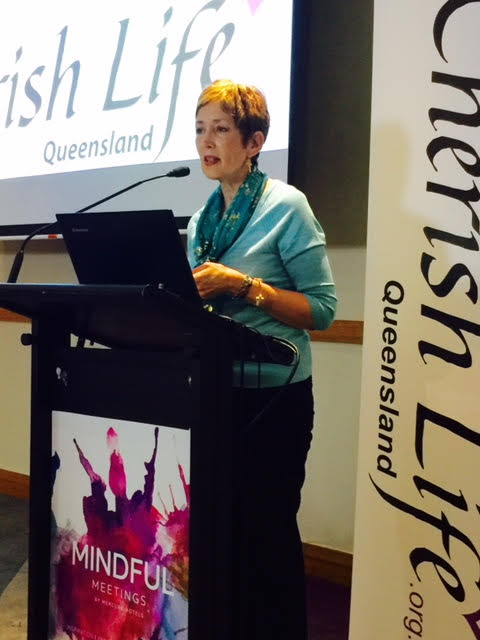
Cindy Collins speaks in Australia
Sex trafficking survivor Julia Walsh recently recounted her heart wrenching story to the Waco Tribune about how her pimp, David Ronald Mims, refused to allow her to seek medical care while pregnant. Four men trafficked Walsh for almost three years, often keeping her in the trunk of a car until they found an abandoned apartment to traffic her from. Walsh eventually escaped and ended up on the streets where she met Mims, who regularly beat her.
“When I was pregnant, I was still using drugs and kept using drugs at first,” she told the paper. “I stopped using the drugs, and at that point, I still had to work and make a quota. He said all that means is that the baby is his property, too. At that point, the safety of my child was pretty much my number one priority.”
Tragically, when she went into labor, Mims refused to take her to the hospital and her little girl was delivered stillborn. Soon after, Walsh and Mims were arrested, and Walsh was able to receive the help she needed from a caring Waco police detective and others dedicated to fight against human trafficking.
Cassie Hammett, executive director of the Shreveport-based nonprofit Purchased, which offers a one-year residential recovery program for women coming out of the sex industry, told the Shreveport Times that sex trafficked victims often do not use protection, therefore STD’s are rampant and victims may seek abortions later in pregnancy.
“The equation in their mind is, ‘I have to use my body to make money, and so I better just get rid of this problem or I won’t be able to do it for much longer,’” Hammett said.
Such was the case for Arien Pauls, who also escaped her trafficker, according to the Fresno Bee. Pauls “became pregnant with her trafficker’s baby [and] he forced her into an illegal, late-term abortion.”
For this reason, Collins notes that abortion becomes a deep trauma — “not only the abortion experience, but the deep feelings of regret because this is a life she never intended to live, and now it’s taken the life of herself and her child, a second victim,” Collins said.
Collins points out that the pro-life community is poised to help in this area because it is already largely organized, “we know how to help- rescue people and set them on their true destiny”:
I have a training that I do for communities, schools, and individuals. And I also have a training for those in the pro-life movement specifically. How to become aware, identify and help. How to connect with law enforcement, agencies and ministries not only on the rescuing side but the restoration side.
Sidewalk counselors need to be trained as well as pregnancy centers. These victims can be difficult to identify. A trafficker could appear to be a parent or friend. They might be escorted by an older boyfriend or older adult, even an older woman. If there is any question look at age difference, and if she looks beaten or drugged, call 911.
In addition, Collins said that law enforcement must be continually trained on human trafficking, “Police need to be made aware. They need to thoroughly investigate each suspected case. 55 percent of women trafficked said they were forced to have an abortion. 70 percent said they had become pregnant. We must encourage local law enforcement to have a new mind also.”
One of the ways Collins has worked to reach these victims in her state is to develop legislation mandating “Point of Rescue” pamphlets or signage be placed inside strip clubs, hotels and abortion facilities. These documents describe what human trafficking is and explain where a victim can go for help. According to the Shreveport Times, Louisiana lawmakers now require a “Point of Rescue” pamphlet to be available to girls seeking abortion. The program is overseen by the state’s Department of Health.
“The department has focused past efforts on another state law ensuring that every woman who seeks an abortion in the state of Louisiana receives robust information about human trafficking,” Louisiana Department of Health and Hospitals spokeswoman Samantha Faulkner told the paper. “Abortion clinics are required to provide each clinic with a brochure.”
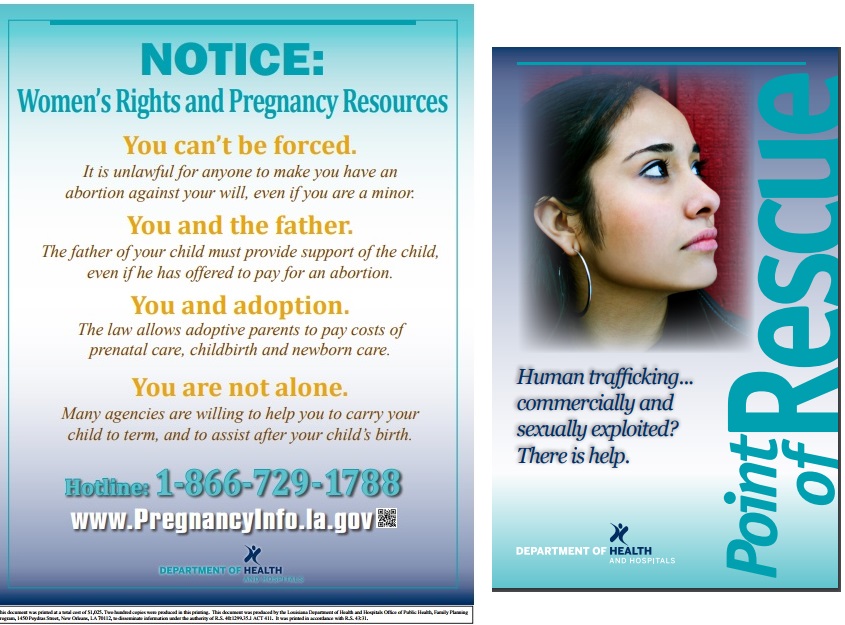
Women’s right to know and Point of Rescue pamphlet for abortion clinics
In addition to the pamphlet, girls seeking abortions in the state are required to be informed that they cannot be coerced or forced into abortion. “It is unlawful for any individual to coerce a minor or adult woman to undergo an abortion. Any physician who performs an abortion upon a woman without her informed consent may be liable to her for damages in a civil action at law,” the website reads in part. The booklet, which abortion-minded women can access, also gives accurate information about the development of the baby and what the abortion entails.
Collins said that she founded SpeakHope.net and SpeakHope media to provide outreach, advocacy, and restorative care to women and youth vulnerable for sexual exploitation, sex trafficking, abuse, and forced abortion. Through outreach and missions, she has become an advocate for women and children here in the US and abroad.
Anyone wanting additional information on how to rescue both mother and child from sex trafficking, can contact Cindy Collins at speakhope@me.com.

